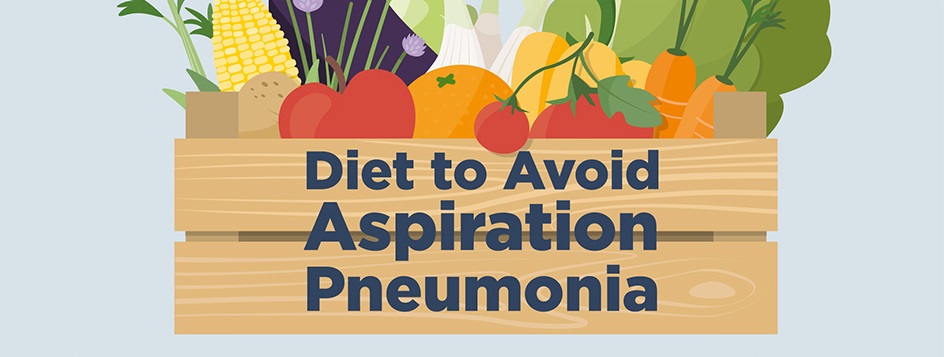Aspiration pneumonia is a type of pneumonia that is caused when food enters the lungs instead of getting swallowed into the stomach. Seniors are at a higher risk of aspiration pneumonia than the general population. Here are some foods that seniors can eat to help avoid aspiration pneumonia.
Read the text alternative of Diet Avoid Aspiration Pneumonia.

Pneumonia is an infection in the lungs that is typically caused by bacteria. One way that this infection can develop is when food, drink, or even saliva are breathed into the lungs instead of swallowed into the stomach. These substances can get stuck in the lungs along with any bacteria they carry, turning into aspiration.
Food to Eat
Generally, tender foods are easier to chew and swallow, helping reduce the chance that they get swallowed down the wrong pipe.
Tender Foods
- Bananas
- Rice
- Ground beef or turkey
- Peeled fruit
- Potatoes
- Fish
- French toast
TIP: You can also cut other foods into small bites to change their consistency and make them easier to swallow. Smaller bites of food can help further reduce the risk of aspiration pneumonia.
Some seniors may be able to swallow pureed foods or thickened liquids more easily than tender foods. These foods should be smooth and not have any lumps.
Pureed Foods
- Smoothie
- Soup
- Pudding
- Yogurt
- Rice cereal
- Pureed fruits or vegetables
- Cottage cheese
TIP: You can puree many foods, including what you prepare for the whole family to eat. Just put a portion of the food in a blender and mix until smooth. You may need to add liquid (water, stock, gravy, sauce, etc.) to get the right consistency.
Food to Avoid
To help prevent aspiration pneumonia, you should avoid foods that can be difficult to chew and swallow.
- Whole fruit
- Seeds and nuts
- Pasta
- Raw vegetables
- Celery
- Scrambled, fried, or hard-boiled eggs
- Corn
- Multi-grain bread
- Beans and peas
- Crackers
Eating Techniques
What a senior eats is as important as how senior eats. Maintaining proper eating techniques during each meal can help reduce the risk of aspiration pneumonia.
- Sit up straight when eating and drinking
- Drink plenty of water with meals
- Take small bites of food
- Eat slowly
- Reduce distractions during mealtime
- Maintain good oral hygiene
- Use assistive utensils as needed
- Avoid talking while eating
Symptoms of Aspiration
While eating and for least 30 minutes after eating, sit upright and watch for aspiration symptoms such as:
- Coughing or wheezing during or after eating
- Excess saliva
- Fever 30 to 60 minutes after eating
- A wet-sounding voice during or after eating or drinking
- Shortness of breath or fatigue while eating
Caring Senior Service offers a pneumonia-specific care program that helps caregivers identify and address the needs of seniors recovering from pneumonia. For more resources on how to manage pneumonia recovery, contact Caring Senior Service.

